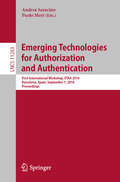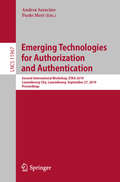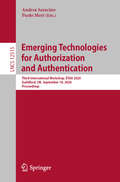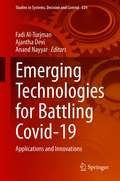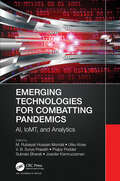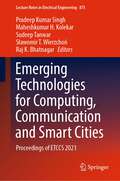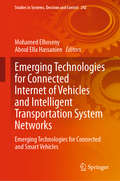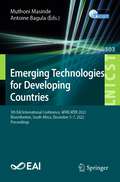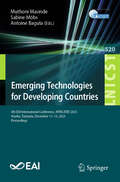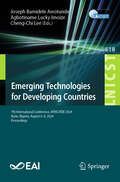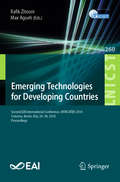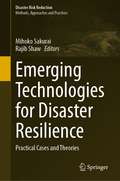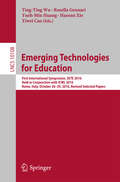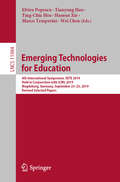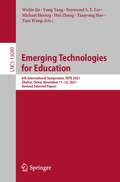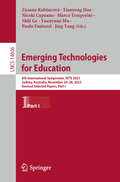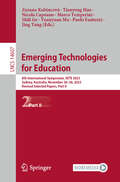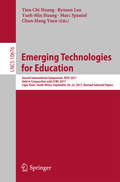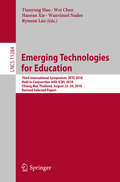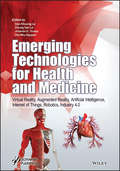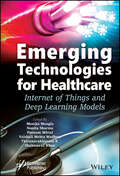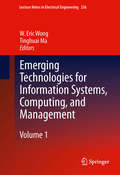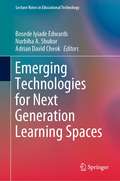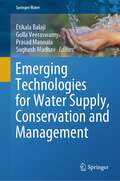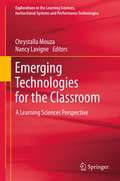- Table View
- List View
Emerging Technologies for Authorization and Authentication: First International Workshop, ETAA 2018, Barcelona, Spain, September 7, 2018, Proceedings (Lecture Notes in Computer Science #11263)
by Paolo Mori Andrea SaracinoThis book constitutes the proceedings of the First International Workshop on Emerging Technologies for Authorization and Authentication, ETAA 2018, held in Barcelona, Spain, in September 2018. The 10 papers presented in this volume were carefully reviewed and selected from 16 submissions. They were organized in two parts: authentication and authorization techniques and violation detection and countermeasures.
Emerging Technologies for Authorization and Authentication: Second International Workshop, ETAA 2019, Luxembourg City, Luxembourg, September 27, 2019, Proceedings (Lecture Notes in Computer Science #11967)
by Paolo Mori Andrea SaracinoThis book constitutes the proceedings of the Second International Workshop on Emerging Technologies for Authorization and Authentication, ETAA 2019, held in Luxembourg, in September 2019. The 10 full papers presented in this volume were carefully reviewed and selected from numerous submissions. They focus on new techniques for biometric and behavioral based authentication, authentication and authorization in the IoT and in distributed systems in general, techniques for strengthen password based authentication and for dissuading malicious users from stolen password reuse, an approach for discovering authentication vulnerabilities in interconnected accounts, and strategies to optimize the access control decision process in the Big Data scenario.
Emerging Technologies for Authorization and Authentication: Third International Workshop, ETAA 2020, Guildford, UK, September 18, 2020, Proceedings (Lecture Notes in Computer Science #12515)
by Paolo Mori Andrea SaracinoThis book constitutes the proceedings of the Third International Workshop on Emerging Technologies for Authorization and Authentication, ETAA 2020, held in Guildford, UK, in September 2020. The 10 full papers presented in this volume were carefully reviewed and selected from 15 submissions. The conference was planned at University of Surrey, Guildford, UK. Due to COVID-19 outbreak, ESORICS conference and affiliated workshop will be held online. The workshop presents new techniques for biometric and behavioral based authentication, and authorization in the IoT and in distributed systems in general, and much more.
Emerging Technologies for Battling Covid-19: Applications and Innovations (Studies in Systems, Decision and Control #324)
by Fadi Al-Turjman Anand Nayyar Ajantha DeviThe book presents recent trends and solutions to help healthcare sectors and medical staff protect themselves and others and limit the spread of the COVID-19. The book also presents the problems and challenges researchers and academics face in tackling this monumental task. Topics include: Unmanned Aerial Vehicle (UAV) or drones that can be used to detect infected people in different areas; robots used in fighting the COVID-19 by protecting workers and staff dealing with infected people; blockchain technology that secures sensitive transactions in strict confidentiality. With contributions from experts from around the world, this book aims to help those creating and honing technology to help with this global threat.
Emerging Technologies for Combatting Pandemics: AI, IoMT, and Analytics
by Mondal, M. Rubaiyat HossainThe COVID-19 pandemic has significantly affected the healthcare sector across the globe. Artificial Intelligence (AI) and the Internet of Medical Things (IoMT) play important roles when dealing with emerging challenges. These technologies are being applied to problems involving the early detection of infections, fast contact tracing, decision-making models, risk profiling of cohorts, and remote treatment. Applying these technologies runs against challenges including interoperability, lack of unified structure for eHealth, and data privacy and security. Emerging Technologies for Combatting Pandemics: AI, IoMT, and Analytics examines multiple models and solutions for various settings including individual, home, work, and society. The world’s healthcare systems are battling the novel coronavirus, and government authorities, scientists, medical practitioners, and medical services are striving hard to surmount these challenges. This book focuses on the design and implementation of AI-based approaches in the proposed COVID-19 solutions that are enabled and supported by IoMT, sensor networks, cloud and edge computing, robotics, and analytics. It covers technologies under the umbrella of AI that include data science, big data, machine learning (ML), semantic technologies, analytics, and cyber security. Highlights of the book include: Epidemic forecasting models Surveillance and tracking systems IoMT and Internet of Healthcare Things-based integrated systems for COVID-19 Social network analysis systems Radiological image- based diagnosis systems Computational intelligence methods This reference work is beneficial for interdisciplinary students, researchers, and healthcare and technology professionals who need to know how computational intelligence could be used for surveillance, control, prevention, prediction, diagnosis, and potential treatment of the disease.
Emerging Technologies for Computing, Communication and Smart Cities: Proceedings of ETCCS 2021 (Lecture Notes in Electrical Engineering #875)
by Pradeep Kumar Singh Maheshkumar H. Kolekar Sudeep Tanwar Raj K. Bhatnagar Sławomir T. WierzchońThis book presents best selected papers presented at the Second International Conference on Emerging Technologies for Computing, Communication and Smart Cities (ETCCS 2021) held on 21-22 August 2021 at BFCET, Punjab, India. IEI India members supported externally. It is co-organized by Southern Federal University, Russia; University of Jan Wyżykowski (UJW), Polkowice, Poland, SD College of Engineering & Technology, Muzaffarnagar Nagar, India as an academic partner and CSI, India for technical support. The book includes current research works in the areas of network and computing technologies, wireless networks and Internet of things (IoT), futuristic computing technologies, communication technologies, security and privacy.
Emerging Technologies for Connected Internet of Vehicles and Intelligent Transportation System Networks: Emerging Technologies for Connected and Smart Vehicles (Studies in Systems, Decision and Control #242)
by Aboul Ella Hassanien Mohamed ElhosenyThis book discusses vehicular communication systems, IoT, intelligent transportation systems and the Internet of Vehicles, and also introduces destination marketing in a structured manner. It is primarily intended for research students interested in emerging technologies for connected Internet of Vehicles and intelligent transportation system networks; academics in higher education institutions, including universities and vocational colleges; IT professionals; policy makers; and legislators. The book can also be used as a reference resource for both undergraduate and graduate studies. Written in plain and simple language, it describes new concepts so that they are accessible to readers without prior knowledge of the field.
Emerging Technologies for Developing Countries: 5th EAI International Conference, AFRICATEK 2022, Bloemfontein, South Africa, December 5-7, 2022, Proceedings (Lecture Notes of the Institute for Computer Sciences, Social Informatics and Telecommunications Engineering #503)
by Muthoni Masinde Antoine BagulaThis book constitutes the refereed conference proceedings of the 5th International Conference on Emerging Technologies for Developing Countries, AFRICATEK 2022, held in Bloemfontein, South Africa, in December 5-7, 2022.The 14 full papers included in this book were carefully reviewed and selected from 24 submissions. They were organized in topical sections as follows: answer set programming; Education in the 4IR Era, Opportunities for driving Efficiencies and Effectiveness, Key 4IR Baseline Architectures, Application of 4IR in Environment and Agriculture Monitoring.
Emerging Technologies for Developing Countries: 6th EAI International Conference, AFRICATEK 2023, Arusha, Tanzania, December 11–13, 2023, Proceedings (Lecture Notes of the Institute for Computer Sciences, Social Informatics and Telecommunications Engineering #520)
by Muthoni Masinde Antoine Bagula Sabine MöbsThis book constitutes the refereed conference proceedings of the 6th EAI International Conference on Emerging Technologies for Developing Countries, AFRICATEK 2023, held in Arusha, Tanzania, during December 11–13, 2023. The 11 full papers in this book were carefully reviewed and selected from 39 submissions. They were organized in topical sections as follows: smart infrastructure and urban management; data security and digital technologies; economic growth and social development; health and well-being; and sustainability and environmental management.
Emerging Technologies for Developing Countries: 7th International Conference, AFRICATEK 2024, Ilorin, Nigeria, August 6–8, 2024, Proceedings (Lecture Notes of the Institute for Computer Sciences, Social Informatics and Telecommunications Engineering #618)
by Agbotiname Lucky Imoize Cheng-Chi Lee Joseph Bamidele AwotundeThis book constitutes the refereed conference proceedings of the 7th International Conference on Emerging Technologies for Developing Countries, AFRICATEK 2024, held in Ilorin, Nigeria, during August 6–8, 2024. The 15 full papers included in this book were carefully reviewed and selected from 42 submissions. They were organized in the below following topics such as : Smart, Sustainable Cities and Climate Change Management; Innovation in Healthcare Systems; Environmental Monitoring, Smart Agriculture and Smart Education.
Emerging Technologies for Developing Countries: First International Eai Conference, Africatek 2017, Marrakech, Morocco, March 27-28, 2017 Proceedings (Lecture Notes of the Institute for Computer Sciences, Social Informatics and Telecommunications Engineering #206)
by Max Agueh Rafik ZitouniThis book constitutes the refereed proceedings of the Second International EAI Conference on Emerging Technologies for Developing Countries, AFRICATEK 2018, held in Cotonou, Benin, in May 2018. The 12 revised full papers and 4 short papers were selected from 27 submissions. The papers are organized thematically in tracks, starting with ITS and security, applications and IT services, gaming and user experience.
Emerging Technologies for Disaster Resilience: Practical Cases and Theories (Disaster Risk Reduction)
by Rajib Shaw Mihoko SakuraiTechnological advances have helped to enhance disaster resilience through better risk reduction, response, mitigation, rehabilitation and reconstruction. In former times, it was local and traditional knowledge that was mainly relied upon for disaster risk reduction. Much of this local knowledge is still valid in today’s world, even though possibly in different forms and contexts, and local knowledge remains a shared part of life within the communities. In contrast, with the advent of science and technology, scientists and engineers have become owners of advanced technologies, which have contributed significantly to reducing disaster risks across the globe. This book analyses emerging technologies and their effects in enhancing disaster resilience. It also evaluates the gaps, challenges, capacities required and the way forward for future disaster management. A wide variety of technologies are addressed, focusing specifically on new technologies such as cyber physical systems, geotechnology, drone, and virtual reality (VR)/ augmented reality (AR). Other sets of emerging advanced technologies including an early warning system and a decision support system are also reported on. Moreover, the book provides a variety of discussions regarding information management, communication, and community resilience at the time of a disaster. This book’s coverage of different aspects of new technologies makes it a valuable resource for students, researchers, academics, policymakers, and development practitioners.
Emerging Technologies for Education
by Yiwei Cao Yueh-Min Huang Ting-Ting Wu Rosella Gennari Haoran XieThis book constitutes the thoroughly refereed post-workshop proceedings of the First International Symposium, SETE 2016, held in conjunction with ICWL 2016, Rome, Italy, in October 2016. The 81 revised papers, 59 full and 22 short ones, were carefully reviewed and selected from 139 submission. They cover latest findings in various areas, such as emerging technologies for open access to education and learning; emerging technologies supported personalized and adaptive learning; emerging technologies support for intelligent tutoring; emerging technologies support for game-based and joyful learning; emerging technologies of pedagogical issues; emerging technologies for affective learning and emerging technologies for tangible learning.
Emerging Technologies for Education: 4th International Symposium, SETE 2019, Held in Conjunction with ICWL 2019, Magdeburg, Germany, September 23–25, 2019, Revised Selected Papers (Lecture Notes in Computer Science #11984)
by Wei Chen Elvira Popescu Marco Temperini Haoran Xie Tianyong Hao Ting-Chia HsuThis book constitutes the thoroughly refereed post-workshop proceedings of the 4th International Symposium, SETE 2019, held in conjunction with ICWL 2019, in Magdeburg, Germany, in September 2019. The 10 full and 6 short papers presented together with 24 papers from 5 workshops were carefully reviewed and selected from 34 submissions. The papers cover the latest findings in various areas, such as: virtual reality and game-based learning; learning analytics; K-12 education; language learning; design, model and implementation of e-learning platforms and tools; digitalization and industry 4.0; pedagogical issues, practice and experience sharing.
Emerging Technologies for Education: 6th International Symposium, SETE 2021, Zhuhai, China, November 11–12, 2021, Revised Selected Papers (Lecture Notes in Computer Science #13089)
by Hui Zhang Weijia Jia Tianyong Hao Yong Tang Raymond S. T. Lee Michael Herzog Tian WangThis book constitutes the refereed conference proceedings of the 6th International Symposium on Emerging Technologies for Education, SETE 2021, held in Zhuhai, China in November 2021. 35 full papers were accepted together with 8 short papers out of 58 submissions. The papers focus on the following subjects: Emerging Technologies for Education, Digital Technology, Creativity, and Education; Education Technology (Edtech) and ICT for Education; Education + AI; Adaptive Learning, Emotion and Behaviour Recognition and Understanding in Education; as well as papers from the International Symposium on User Modeling and Language Learning (UMLL2021) and the International Workshop on Educational Technology for Language Learning (ETLL 2021).
Emerging Technologies for Education: 8th International Symposium, SETE 2023, Sydney, Australia, November 26–28, 2023, Revised Selected Papers, Part I (Lecture Notes in Computer Science #14606)
by Marco Temperini Jing Yang Tianyong Hao Zuzana Kubincová Yuanyuan Mu Nicola Capuano Shili Ge Paolo FantozziThis two-volume set LNCS 14606-14607 constitutes the revised selected papers of several workshops which were held in conjunction with the 8th International Symposium on Emerging Technologies for Education, SETE 2023, held in Sydney, Australia, during November 26–28, 2022\3. The 46 revised full papers presented in this book were carefully reviewed and selected from 23 submissions. SETE 2023 presented the following six workshops: First International Workshop on Cognitive Neuroscience of Language Learning (CLNN). Second International Workshop on Digitalization In Language And Cross-Cultural Education (DLCCE). Sixth International Workshop on Educational Technology for Language Learning (ETLL). Second Workshop on Hardware And Software Systems as Enablers for Lifelong Learning (HASSELL). Ninth International Workshop on Peer Review, Peer Assessment, and Self Assessment in Education (PRASAE).
Emerging Technologies for Education: 8th International Symposium, SETE 2023, Sydney, Australia, November 26–28, 2023, Revised Selected Papers, Part II (Lecture Notes in Computer Science #14607)
by Marco Temperini Jing Yang Tianyong Hao Zuzana Kubincová Yuanyuan Mu Nicola Capuano Shili Ge Paolo FantozziThis two volume set constitutes the revised selected papers of several workshops which were held in conjunction with the 8th International Symposium on Emerging Technologies for Education, SETE 2023, held in Sydney, Australia, in November 26–28, 2022\3. The 46 revised full papers presented in this book were carefully reviewed and selected from 23 submissions. The SETE 2023 presented the following six workshops: – 1st International Workshop on Cognitive Neuroscience of Language Learning (CLNN) – 2th International Workshop on Digitalization In Language And Cross-Cultural Education (DLCCE) – 6th International Workshop on Educational Technology for Language Learning (ETLL) – 2nd Workshop on Hardware And Software Systems as Enablers for Lifelong Learning (HASSELL) – 9th International Workshop on Peer Review, Peer Assessment, and Self Assessment in Education (PRASAE)
Emerging Technologies for Education: Second International Symposium, Sete 2017, Held In Conjunction With Icwl 2017, Cape Town, South Africa, September 20-22, 2017, Proceedings (Lecture Notes in Computer Science #10676)
by Rynson Lau Yueh-Min Huang Marc Spaniol Tien-Chi Huang Chun-Hung YuenThis book constitutes the thoroughly refereed post-workshop proceedings of the Second International Symposium, SETE 2017, held in conjunction with ICWL 2017, Cape Town, South Africa, in September 2017. The 52 full and 13 short papers were carefully reviewed and selected from 123 submissions. This symposium attempts to provide opportunities for the crossfertilization of knowledge and ideas from researchers in diverse fields that make up this interdisciplinary research area.
Emerging Technologies for Education: Third International Symposium, SETE 2018, Held in Conjunction with ICWL 2018, Chiang Mai, Thailand, August 22–24, 2018, Revised Selected Papers (Lecture Notes in Computer Science #11284)
by Wei Chen Rynson Lau Haoran Xie Tianyong Hao Wanvimol NadeeThis book constitutes the thoroughly refereed post-workshop proceedings of the Third International Symposium, SETE 2018, held in conjunction with ICWL 2018, Chiang Mai, Thailand, in August 2018.The 23 full and 3 short papers were carefully reviewed and selected from 51 submissions. The papers have been organized in the following topical sections: Emerging Technologies of Design, Model and Framework of Learning Systems; Emerging Technologies Support for Intelligent Tutoring; Emerging Technologies Support for Game-Based and Joyful Learning; Emerging Technologies of Pedagogical Issues; UMLL (International Symposium on User Modeling and Language Learning); ETLTL (International Workshop on Educational Technology for Language and Translation Learning)
Emerging Technologies for Health and Medicine: Virtual Reality, Augmented Reality, Artificial Intelligence, Internet of Things, Robotics, Industry 4.0
by Dac-Nhuong Le Chung Van Le Jolanda G. Tromp Gia Nhu NguyenWith the current advances in technology innovation, the field of medicine and healthcare is rapidly expanding and, as a result, many different areas of human health diagnostics, treatment and care are emerging. Wireless technology is getting faster and 5G mobile technology allows the Internet of Medical Things (IoMT) to greatly improve patient care and more effectively prevent illness from developing. This book provides an overview and review of the current and anticipated changes in medicine and healthcare due to new technologies and faster communication between users and devices. This groundbreaking book presents state-of-the-art chapters on many subjects including: A review of the implications of VR and AR healthcare applications A review of current augmenting dental care An overview of typical human-computer interaction (HCI) that can help inform the development of user interface designs and novel ways to evaluate human behavior to responses in virtual reality (VR) and other new technologies A review of telemedicine technologies Building empathy in young children using augmented reality AI technologies for mobile health of stroke monitoring & rehabilitation robotics control Mobile doctor brain AI App An artificial intelligence mobile cloud computing tool Development of a robotic teaching aid for disabled children Training system design of lower limb rehabilitation robot based on virtual reality
Emerging Technologies for Healthcare: Internet of Things and Deep Learning Models (Machine Learning in Biomedical Science and Healthcare Informatics)
by Monika Mangla Nonita Sharma Poonam Mittal Vaishali Mehta Wadhwa Thirunavukkarasu K. Shahnawaz Khan“Emerging Technologies for Healthcare” begins with an IoT-based solution for the automated healthcare sector which is enhanced to provide solutions with advanced deep learning techniques. The book provides feasible solutions through various machine learning approaches and applies them to disease analysis and prediction. An example of this is employing a three-dimensional matrix approach for treating chronic kidney disease, the diagnosis and prognostication of acquired demyelinating syndrome (ADS) and autism spectrum disorder, and the detection of pneumonia. In addition, it provides healthcare solutions for post COVID-19 outbreaks through various suitable approaches, Moreover, a detailed detection mechanism is discussed which is used to devise solutions for predicting personality through handwriting recognition; and novel approaches for sentiment analysis are also discussed with sufficient data and its dimensions. This book not only covers theoretical approaches and algorithms, but also contains the sequence of steps used to analyze problems with data, processes, reports, and optimization techniques. It will serve as a single source for solving various problems via machine learning algorithms.
Emerging Technologies for Information Systems, Computing, and Management
by Tinghuai Ma W. Eric WongThis book aims to examine innovation in the fields of information technology, software engineering, industrial engineering, management engineering. Topics covered in this publication include; Information System Security, Privacy, Quality Assurance, High-Performance Computing and Information System Management and Integration. The book presents papers from The Second International Conference for Emerging Technologies Information Systems, Computing, and Management (ICM2012) which was held on December 1 to 2, 2012 in Hangzhou, China.
Emerging Technologies for Next Generation Learning Spaces (Lecture Notes in Educational Technology)
by Adrian David Cheok Bosede Iyiade Edwards Nurbiha A. ShukorThis book discusses the development of the next generation learning spaces with emerging technologies. These spaces result from the combined needs of classroom stakeholders, such as instructors and learners, with classroom elements, such as tools and technologies, pedagogy and content. The book presents discussions and studies on issues, possibilities and implications of these changes for next generation education. Novel ideas, and studies on these all-encompassing, blended roles of technologies in next generation learning spaces are clearly presented. Suggestions on how the benefits they offer can be maximized are also discussed. Engaging learning technologies have remained central in education for assisting instructors to teach and learners to learn, more effectively. However, recent technological growth is creating a system in which previous divides between key classroom concepts and stakeholders are getting progressively blurred. This is giving rise to next generation learning spaces where elements and stakeholders are blended into one. The book addresses the future of learning environments based on these perspectives.
Emerging Technologies for Water Supply, Conservation and Management (Springer Water)
by Sughosh Madhav Etikala Balaji Golla Veeraswamy Prasad MannalaThis book deals with the role of emerging technologies such as remote sensing and GIS and artificial intelligence/machine learning in water supply, conservation and management for sustainable development. These are low-cost new technologies that address current challenges dealing with large data sets, such as identifying spatial and temporal variations in water quality parameters and contaminants, groundwater potential zones and water supply and management issues. This book is helpful to show the paths of reducing the burden of time and cost and is the alternative options for the conventional practices in water supply, conservation and management. Further, the outcomings of this book are helpful for policy makers, researchers and readers.
Emerging Technologies for the Classroom
by Chrystalla Mouza Nancy LavigneThis book provides contemporary examples of the ways in which educators can use digital technologies to create effective learning environments that support improved learning and instruction. These examples are guided by multiple conceptual and methodological traditions evolving from the learning sciences and instructional technology communities as well as other communities doing important work on learning technologies. In particular, the book provides examples of technology innovations and the ways in which educators can use them to foster deep understanding, collaboration, creativity, invention, and reflection. Additional examples demonstrate the ways in which emerging mobile and networked technologies can help extend student learning beyond the confines of the classroom wall and support student-directed learning and new media literacies.
